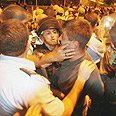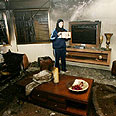

The Syrian government reacted to the Akko Riots that began on Yom Kippur by dubbing the occurrences "an expression of a methodical policy of racism" seeking to eliminate Arab presence in Israel by frightening the sect into leaving the country.
"Its hate and terror crimes have been known and documented for 60 years. These crimes derive from pure Zionist intentions, rabbinical orders, and conventions of the Zionist movement dealing with the banishment of the other, original land-owners."
The article went on to say that "what occurred in Akko is an expression of a methodical and consistent policy of racism attempting to fight the presence of Arabs in Israel by frightening them into leaving, Similarly to methods adopted by the 'Haganah' gangs and other Zionist terrorist gangs."
The article adopts an accusatory tone towards Jews throughout the area. "The settlers who were brought from Safed and Tiberias set fire to Arab homes… with the direct support of Israeli military units in order to thwart any attempt at objection by the residents of those homes and succeed in their mission to Judaize Akko and Arab property," it said.
The article added that "despite all of the terrorism directed against Akko's Arabs, the Zionists did not succeed in achieving their mission."
The piece concludes by criticizing the US government and its consistent support of Israel. "After all of this, is it not shameful that the US has conspired to revoke the UN Resolution determining that Zionism is a form of racism and discrimination? Is this not the US' green light to Israel, to complete its plans to transfer the Arabs?"
'Police yielded to Jewish hooligans'
Meanwhile MK Ahmad Tibi (United Arab List-Ta'al) voiced his objections over the arrest of the Arab whose Yom Kippur drive through a Jewish neighborhood sparked the Akko Riots, calling the move an unbelievable and unlawful decision made by Israel Police."
Tibi added that "the arrest proves that police have yielded to Jewish hooligans, and I wonder if from now on they will start arresting Jews who eat and drink during the Ramadan."
Sharon Roffe-Ofir contributed to this report















